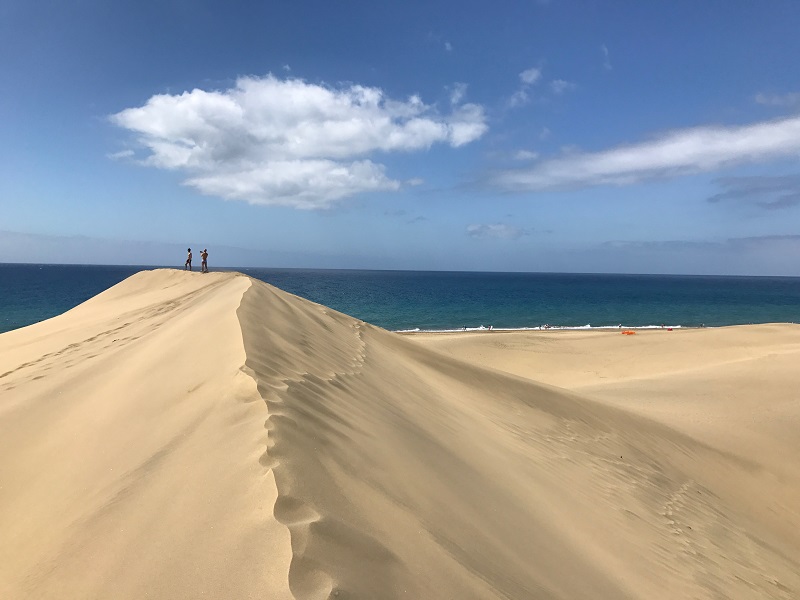What to do in Gran Canaria
Whether you are visiting as a tourist or are a resident on the island, we provide you with a curated list of the top things to do in Gran Canaria, along with a comprehensive guide to activities, must-see places, and sites to explore in this Canary paradise.
If you are still unsure about visiting the island, here are 40 compelling reasons to consider Gran Canaria as your next destination.
And if you have already chosen your place of accommodation, you can directly check the activities and excursions in your area. Look up what to do in Maspalomas, the essential activities and excursions in Playa del Ingles, find the best things to do in Puerto Rico, discover what excursions to do from Meloneras, excursions in Las Palmas, activities in Puerto de Mogan, and what to do in San Agustín.
Gran Canaria Activities
The year-round spring-like weather in Gran Canaria allows you to enjoy a wide variety of outdoor activities at any time of the year. Here are some of the most popular activities to do on the island.
Explore the Island
Discover the most iconic places and hidden treasures of Gran Canaria through one or more excursions. You can choose to explore the island on your own or let us accompany you to make your experience more comfortable, informative, and safe. If you have any doubts about the best way to see the island, this article will help you decide. Besides the traditional bus and minibus excursions, we offer exciting jeep tours and hiking excursions, perfect for adventure and nature lovers. These options will allow you to access places that would otherwise be inaccessible, guaranteeing you a unique and memorable experience.

Enjoy a Boat Trip
The favourable climate in the south of Gran Canaria, from where all the boat trips depart, allows you to enjoy maritime trips in any season of the year. Don’t miss out on some boat experiences and choose from coastal cruises, dolphin-watching trips, submarine tours, boat parties, fishing trips, ferries from Puerto Rico to Mogan or from Arguineguín to Mogan, private boat trips, and catamaran tours.
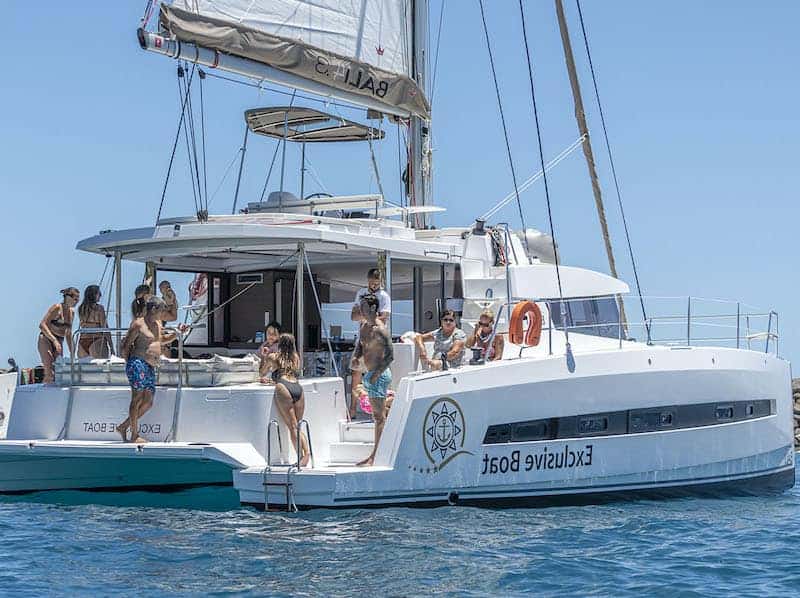
Have Fun with Water Sports
Enjoy a wide range of water sports in Gran Canaria throughout the year. Although the island is known as a paradise for scuba diving, surfing, windsurfing, and kitesurfing, we recommend opting for a parasailing flight, hiring a jet ski, embarking on an exciting jet ski excursion, or enjoying a relaxing kayak trip along the coast. These options are easier to enjoy, offer an extra dose of excitement, and are accessible to everyone.
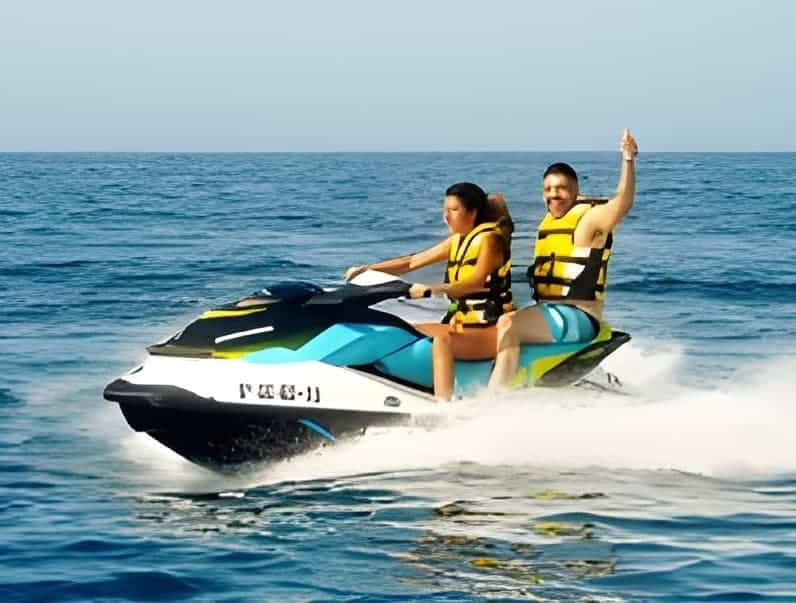
Drive a Buggy
Taking a buggy excursion in Gran Canaria is almost a must if you love adrenaline and adventure. Driving a buggy is very easy, and you only need to have had a driving licence for 2 years to enjoy off-road (dirt and gravel tracks) routes practically any day of the year.
Ride a Camel or Horse
One of the most popular leisure options for families, couples, and groups of friends in Gran Canaria is a camel ride in the Natural Park of the Maspalomas Dunes. The ride lasts 30 minutes, but the experience lasts a lifetime.
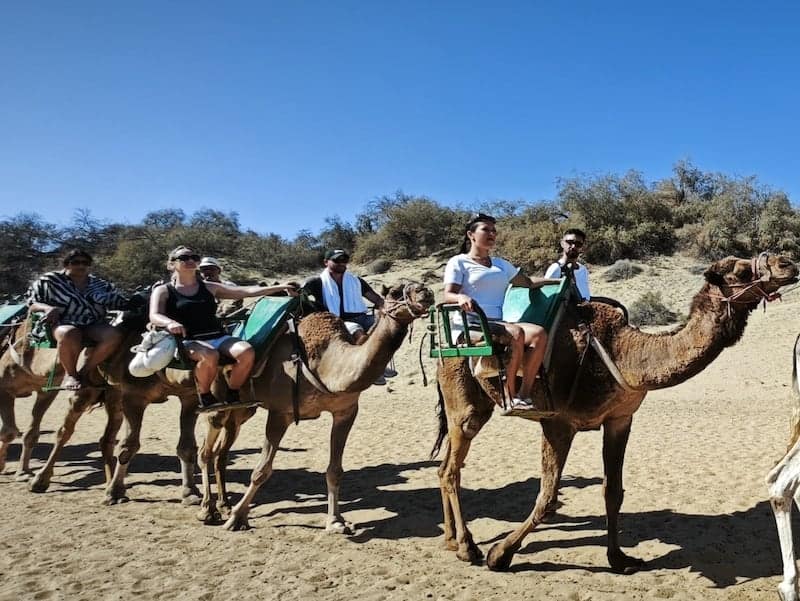
If you are more interested in horse riding, you can book a 1 or 2-hour excursion to take a ride through nature while enjoying the spectacular views of the Barranco de la Negra in the south of Gran Canaria.
Visit a Theme Park
Visiting a theme park in Gran Canaria is a fantastic way to spend the day. You have a variety of options, from an exciting water park to zoos with animal shows, a western adventure park, small amusement parks full of fun, and a magnificent aquarium. Each offers a unique and memorable experience, ensuring fun for the whole family.
Taste Canarian Cuisine
The high quality and wide variety of restaurants are compelling reasons to enjoy a meal or dinner during your holiday. We recommend exploring the exquisite Canarian cuisine, highlighting dishes such as papas arrugadas with mojo picón, the tasty carne de cochino negro, and the juicy pata asada.
Enjoy the Nightlife
The wide variety of bars, nightclubs, pubs, and night spots in the main tourist centres of the island, combined with its safety, constant spring-like climate, and the enthusiasm of tourists who visit throughout the year, make nights out in Gran Canaria lively and exciting experiences.
Relax on the Beach
Sun and sand are the main attractions of Gran Canaria. With 236 km of coastline, the island boasts over 60 km of breathtaking beaches. Among these are some of the world’s best, including Playa de Las Canteras, Playa del Inglés, Maspalomas, and the beaches of Amadores, Puerto Rico, and Puerto de Mogán. These beaches offer golden sands, crystal-clear waters, and a paradise-like setting, perfect for an unforgettable holiday experience.
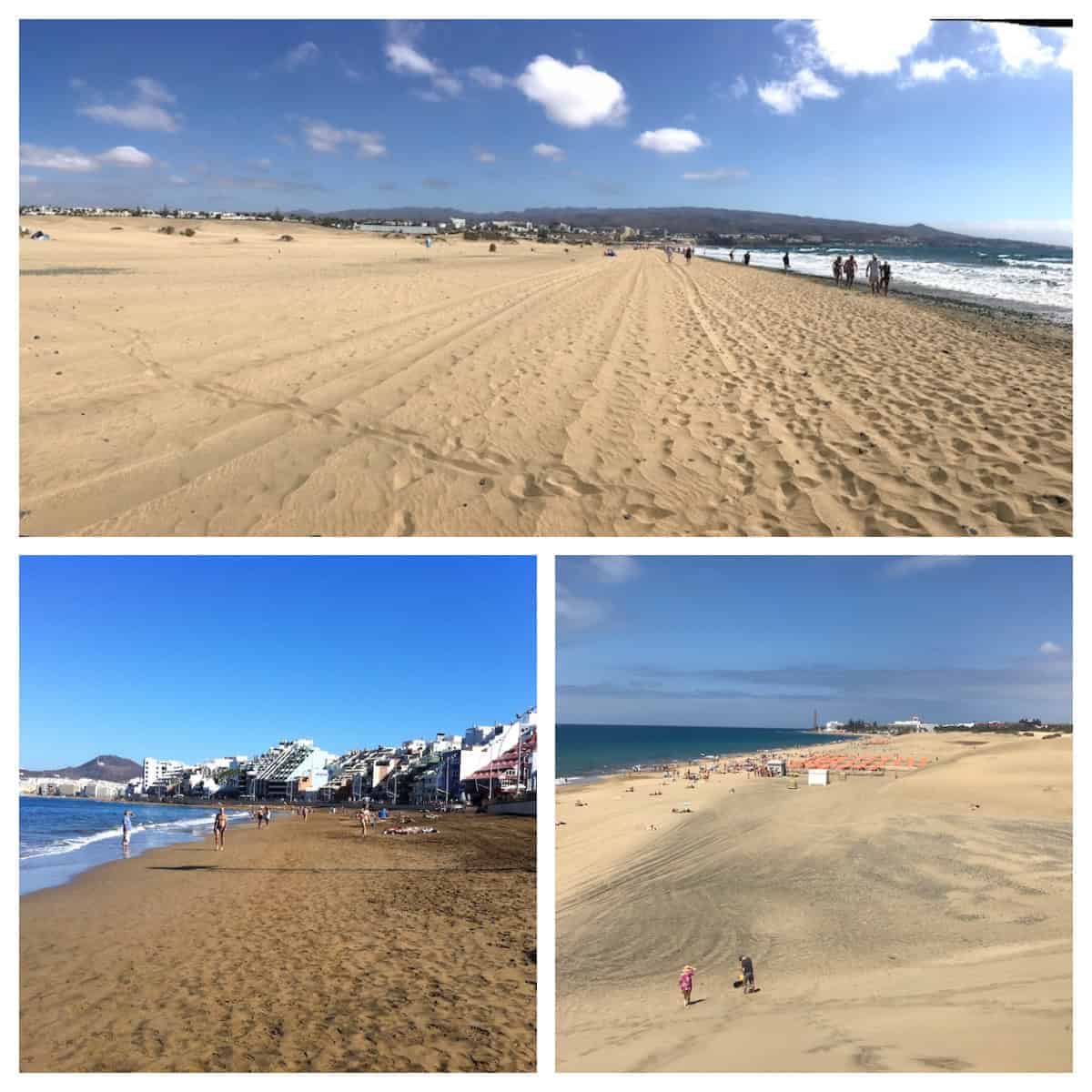
20 places you must see and visit in Gran Canaria
SOUTHERN AREA
Puerto de Mogán
Known as “Little Venice” thanks to its canals, this city nestled in an old fishing town is one of Gran Canaria’s most visited places. Walk along its quiet streets, lined with white-faced two-story houses with colorful flowers on their balconies. ![[cml_media_alt id='10483']visitar Mogán[/cml_media_alt]](https://www.okgrancanaria.com/wp-content/uploads/2017/07/DSC_04381-1024x683-800x529.jpg) Enjoy its beach, tour its sports pier or eat something at one of the numerous restaurants.
Enjoy its beach, tour its sports pier or eat something at one of the numerous restaurants. ![[cml_media_alt id='9229']Tour alrededor de Gran Canaria[/cml_media_alt]](https://www.okgrancanaria.com/wp-content/uploads/2016/08/CIMG0399-1.jpg)
If you come on a Friday, you can also explore its popular market.
Don’t forget that you can experience a unique adventure from Puerto de Mogán: going 20 metres under the sea in a yellow submarine.![[cml_media_alt id='10104']Viaje en el submarino amarillo de puerto de mogan[/cml_media_alt]](https://www.okgrancanaria.com/wp-content/uploads/2016/07/hangar-submarino-mogan.jpg)
Related tours
- Puerto de Mogan and its market tour
- Around the Island tour
- Yellow Submarine trip
- Southern treasures from Las Palmas
Dunes of Maspalomas
Without a doubt, the landscape formed by the dunes of Maspalomas is the island’s most representative and iconic. Its 400 hectares of dunes, which can be over 10 metres high and stretch to the banks of Maspalomas Beach, make this place one of Gran Canaria’s most photographed. ![[cml_media_alt id='12566']Pasear por las Dunas en Maspalomas[/cml_media_alt]](https://www.okgrancanaria.com/wp-content/uploads/2018/09/Dunas-de-Maspalomas-1.jpg) The best place to contemplate the immensity of this natural space is the Lookout near the Riu Palace Maspalomas hotel.
The best place to contemplate the immensity of this natural space is the Lookout near the Riu Palace Maspalomas hotel.
If you want to feel like a nomad, we recommend you do one of Gran Canaria’s most popular activities and go on a camel ride through the Dunes of Maspalomas. ![[cml_media_alt id='10225']montar a camello en las dunas de Maspalomas[/cml_media_alt]](https://www.okgrancanaria.com/wp-content/uploads/2017/07/camello-trabajando.jpg)
Related tours
- Camel Ride in Gran Canaria
- Southern treasures from Las Palmas
- Grand Tour to the Maspalomas Dunes, Fataga, and Tejeda
Maspalomas Lighthouse
The Maspalomas Lighthouse has been declared a World Heritage Site and is one of the oldest functioning lighthouses on the Canary Islands. It is 60 metres tall and up to 6.2 metres wide, which means it can be seen from almost anywhere on Maspalomas Beach.![[cml_media_alt id='7275']visitas guias Maspalomas[/cml_media_alt]](https://www.okgrancanaria.com/wp-content/uploads/2016/06/visita-guiada-faro-de-Maspalomas.jpg)
Guayadeque Ravine
Declared a Natural Monument and a World Heritage Site, the Guayadeque Ravine is one of the island’s most well-known and beautiful canyons. It is 11 kilometres long and its steep walls are hundreds of metres tall.![[cml_media_alt id='9338']Visita al Barranco de Guayadeque[/cml_media_alt]](https://www.okgrancanaria.com/wp-content/uploads/2017/02/DSC_0507.jpg)
Related tours
- Gran Canaria Vip Tour – Guayadeque ravine, Firgas, Roque Nublo, Fataga, Valley of the thousand palms, …
- Southern treasures from Las Palmas
- Can-am Ryker tour
- Grand Tour to the Maspalomas Dunes, Fataga, and Tejeda
Village of Agüimes
The historic centre of Agüimes is, without a doubt, one of Gran Canaria’s most beautiful. The houses offer the perfect example of the island’s traditional architecture, with stone and lime facades. ![[cml_media_alt id='12568']Visitar la Villa de Aguimes en Gran Canaria[/cml_media_alt]](https://www.okgrancanaria.com/wp-content/uploads/2018/09/Iglesia-de-Agüimes.jpg) Touring its streets, you will see many sculptures adorning them, the most popular of which is the camel.
Touring its streets, you will see many sculptures adorning them, the most popular of which is the camel. ![[cml_media_alt id='12573']Estatua de Camello en Aguimes[/cml_media_alt]](https://www.okgrancanaria.com/wp-content/uploads/2018/09/Estatuas-de-Aguimes.jpg)
Related tours
- Gran Canaria Vip Tour – Guayadeque ravine, Firgas, Roque Nublo, Fataga, Valley of the thousand palms, …
- Can-am Ryker tour
Degollada de la Yegua Lookout
Very close to Maspalomas and Playa del Inglés is a landscape that you can’t miss. It’s one of those hidden treasures that is much closer than you think.
From the Degollada de la Yegua Lookout, you can see a panoramic view of the Fataga ravine, a large canyon 15 metres long and comprised of arid scenery, which is gorgeous at any time of day. 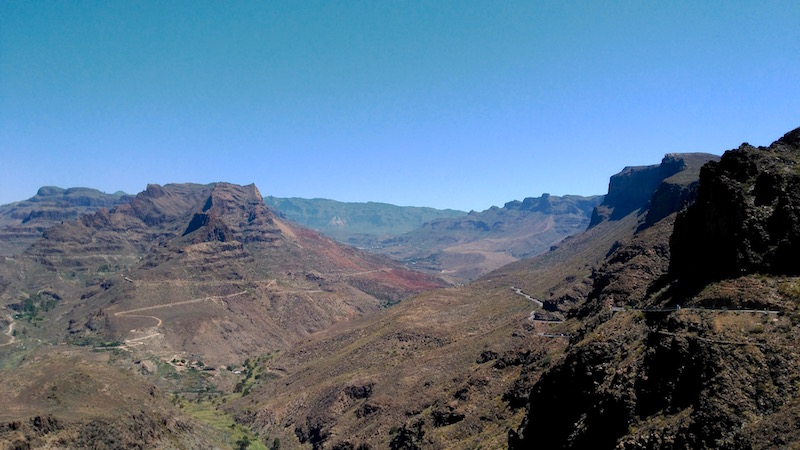
Related tours
- Gran Canaria Vip Tour – Guayadeque ravine, Firgas, Roque Nublo, Fataga, Valley of the thousand palms, …
- Gran Canaria Highlights – Arucas, Teror, Roque Nublo, Valley of the thousand palms, viewpoint of “Degollada de la Yegua, …
Fataga
This small town in the island’s southern region is also one of the island’s most beautiful. It is outstanding due to its location in the Fataga Ravine, the beauty of the surrounding palm trees, and the traditional Canary architecture of its homes. Its narrow, steep and cobbled streets are lined with low houses with white facades made of stone that contrast with the wooden windows and doors.![[cml_media_alt id='7271']visitar fataga[/cml_media_alt]](https://www.okgrancanaria.com/wp-content/uploads/2016/06/Fataga1.jpg)
Related tours
- Gran Canaria Vip Tour – Guayadeque ravine, Firgas, Roque Nublo, Fataga, Valley of the thousand palms, …
- Gran Canaria Highlights – Arucas, Teror, Roque Nublo, Valley of the thousand palms, viewpoint of “Degollada de la Yegua, …
- VIP tour in a van with a chauffeur/guide
Valley of 1000 Palms
Located in the Fataga Ravine, this area has numerous Canary palm trees (Phoenix canariensis), which make this an oasis in the desert.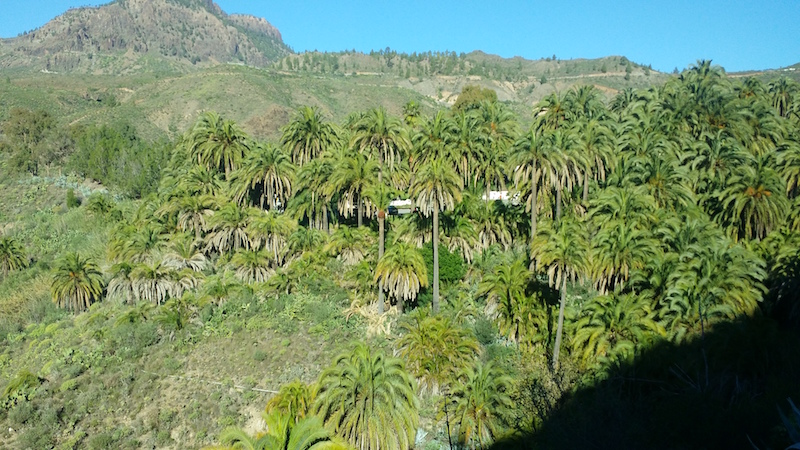 In addition to seeing this valley on our excursions, you can also ride a camel through the Fataga Ravine while enjoying the canyon’s impressive views.
In addition to seeing this valley on our excursions, you can also ride a camel through the Fataga Ravine while enjoying the canyon’s impressive views.![[cml_media_alt id='5215']Paseo a camelo en las palmas[/cml_media_alt]](https://www.okgrancanaria.com/wp-content/uploads/2015/11/portada-camellos-gran-canaria.jpeg)
Related tours
- Gran Canaria Vip Tour – Guayadeque ravine, Firgas, Roque Nublo, Fataga, Valley of the thousand palms, …
- Gran Canaria Highlights – Arucas, Teror, Roque Nublo, Valley of the thousand palms, viewpoint of “Degollada de la Yegua, …
- VIP tour in a van with a chauffeur/guide
- Excursion in a 4X4 Jeep with a chauffeur/guide
Fortaleza de Ansite (Ansite Fortress)
The Fortress of Ansite is a complex of caves located in the municipality of Santa Lucía de Tirajana, naturally protected by the rugged surroundings of the Tiraja ravine. This site served as a refuge for the ancient Canarian aborigines and was the scene of the final battle in the conquest of Gran Canaria by the Kingdom of Castile (Now part of Spain).
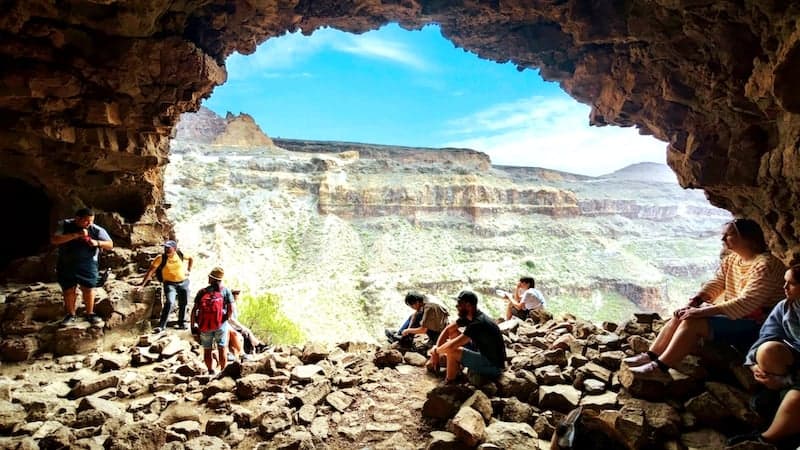
Related tours
Barranco de las Vacas (Red Canyon)
Barranco de las Vacas is a 100-meter-long canyon with impressive red rock walls. In recent years, it has become a popular spot among Instagram enthusiasts, drawn by its scenic beauty and unique geological formations.
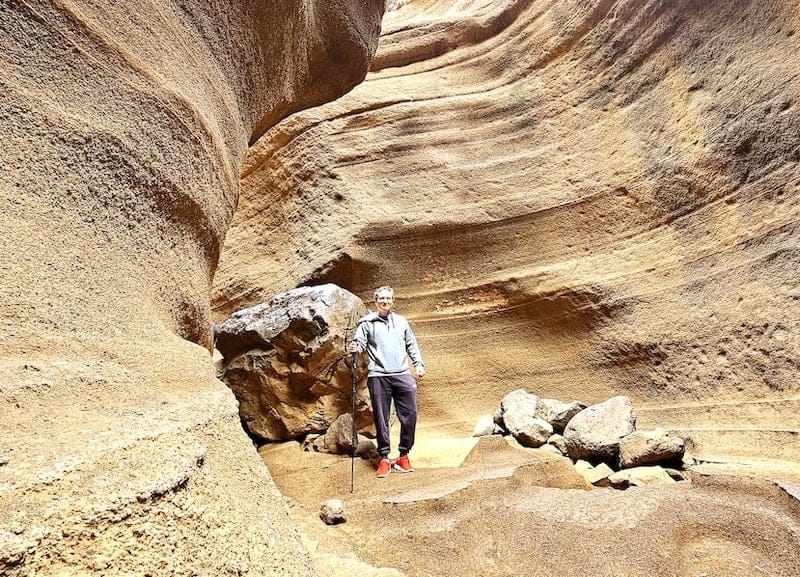
Related tours
CENTRAL AREA
Village of Tejeda
Tejeda is considered one of Spain’s most beautiful villages due to its location and the white facades of its houses, which is typical of the island’s traditional architecture. Located 1050 metres above sea level, Tejeda is in itself a spectacular lookout from which to contemplate Roque Nublo and Roque Bentayga.
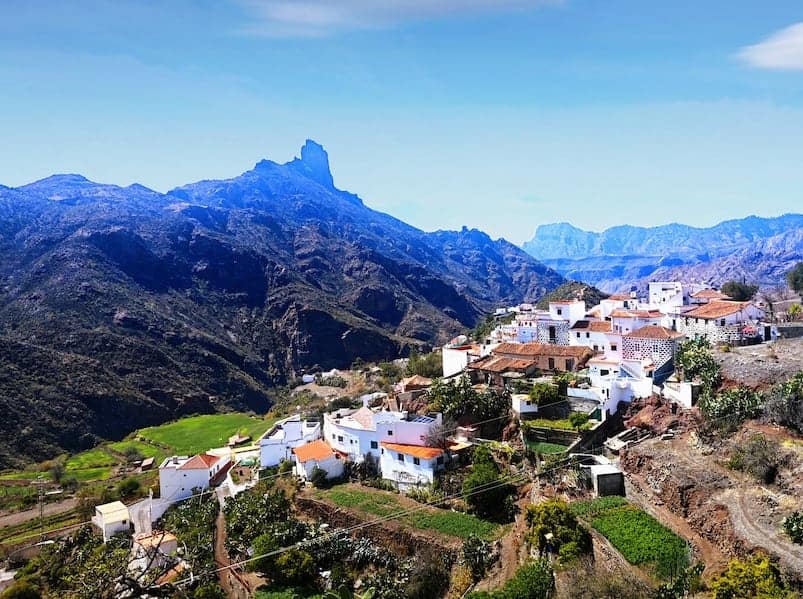
Related tours
Roque Nublo and Roque Bentayga
These rocky monoliths in central Gran Canaria are two of the island’s most important natural symbols. Located very close to one another, Roque Nublo (Cloud Rock) is larger at 80 metres tall and a height of 1,813 metres above sea level, while Roque Bentayga reaches 1,414 metres above sea level.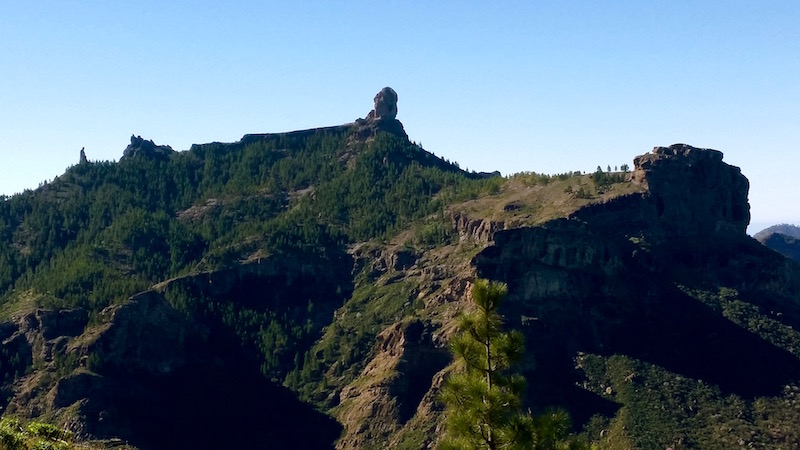
Related tours
- Gran Canaria Vip Tour – Guayadeque ravine, Firgas, Roque Nublo, Fataga, Valley of the thousand palms, …
- Gran Canaria Highlights – Arucas, Teror, Roque Nublo, Valley of the thousand palms, viewpoint of “Degollada de la Yegua, …
- VIP tour in a van with a chauffeur/guide
- Teror, Bandama volcano and Peaks tour
- Grand Tour to the Maspalomas Dunes, Fataga, and Tejeda
Bandama Crater
Also known as the Bandama Caldera or the Bandama Volcano, this crater is the island’s largest at over 1,000 metres in diameter and 200 metres deep.
<p “>From the nearby lookout, you can contemplate the crater, the coast and some villages toward the north, since it is 569 metres above sea level.![[cml_media_alt id='12589']Vista desde el Pico de Bandama[/cml_media_alt]](https://www.okgrancanaria.com/wp-content/uploads/2018/09/IMG_20160529_140221.jpg)
Related tours
- Excursion to Las Palmas de Gran Canaria, Bandama Volcano and the Botanical Garden
- Teror, Bandama volcano and Peaks tour
Church of Saint John the Baptist
Located in the historic district of the city of Arucas, this neoclassic church was built between 1909 and 1977. Its impressive facade causes many people to call it the Cathedral of Arucas. ![[cml_media_alt id='12569']Catedral de Arucas[/cml_media_alt]](https://www.okgrancanaria.com/wp-content/uploads/2018/09/Iglesia-de-Arucas-desde-el-parque-de-los-enamorados.jpg)
Related tours
- Gran Canaria Highlights – Arucas, Teror, Roque Nublo, Valley of the thousand palms, viewpoint of “Degollada de la Yegua, …
- Northern treasures
Village of Firgas
In the heart of Firgas lies its main attraction: a steep street divided into two sections. At the lower end, you’ll discover a 30-meter-long cascading fountain, along with mosaics and heraldic shields representing the island’s 21 municipalities.
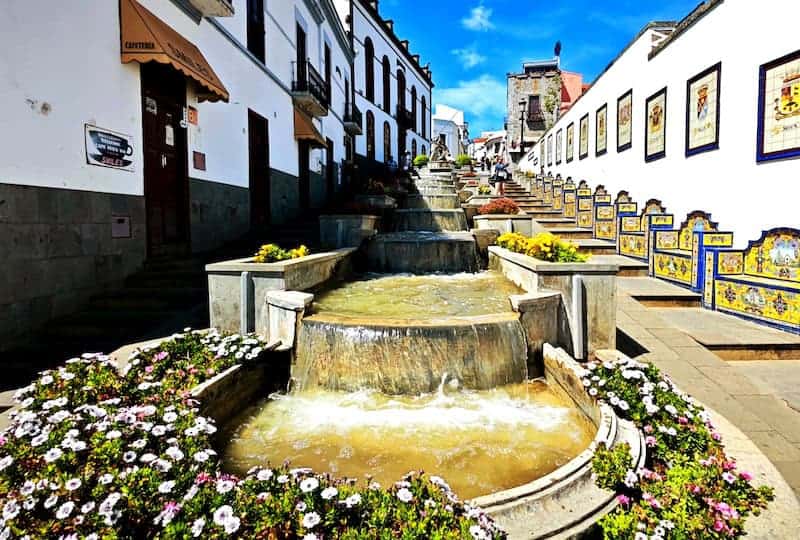
Related tours
- Northern treasures
- Gran Canaria Vip Tour – Guayadeque ravine, Firgas, Roque Nublo, Fataga, Valley of the thousand palms, …
Village of Teror
Teror is probably the most-visited town in Gran Canaria due to its charm. The historic centre is known for the facades of its two-story houses in which the wooden balconies really stand out.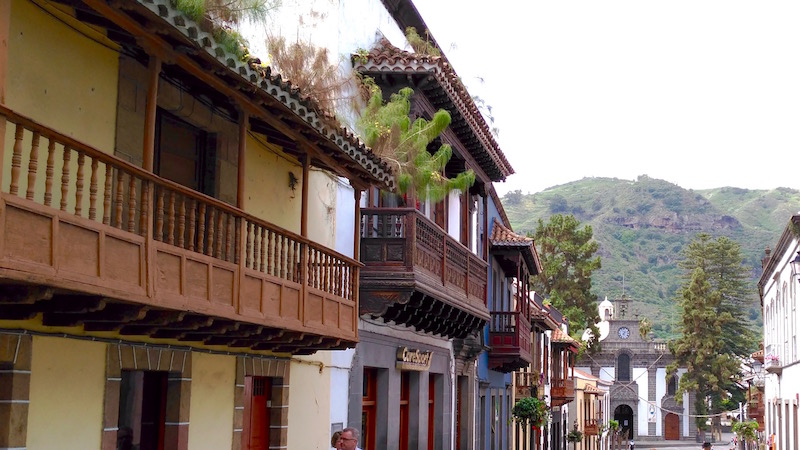 Take advantage of your time in Teror to visit the Basilica of the Pine, one of the most venerated churches on the island.
Take advantage of your time in Teror to visit the Basilica of the Pine, one of the most venerated churches on the island. ![[cml_media_alt id='9839']Visitar los mercadillos de teror y San Mateo de Gran Canaria[/cml_media_alt]](https://www.okgrancanaria.com/wp-content/uploads/2017/03/Teror-calle-principal.jpg)
Related tours
- Gran Canaria Highlights – Arucas, Teror, Roque Nublo, Valley of the thousand palms, viewpoint of “Degollada de la Yegua, …
- Visit to Teror and San Mateo markets
- Teror, Bandama volcano and Peaks tour
Basilica of Our Lady of the Pine
The Basilica of the Pine is located in the historic district in the village of Teror and was built in the neoclassic and gothic styles.
It is a pilgrimage destination for the inhabitants of Gran Canaria since the island’s patron saint, the Virgin of the Pine, is found here.![[cml_media_alt id='15649']Basílica del Pino[/cml_media_alt]](https://www.okgrancanaria.com/wp-content/uploads/2018/12/villa-de-teror.jpg)
NORTHERN AREA
Northern Cliffs
At the famed “Dragon’s Tail,” you will encounter Europe’s highest cliffs, soaring over 1,000 meters. The tallest point is Roque Faneque, standing at an impressive 1,008 meters.
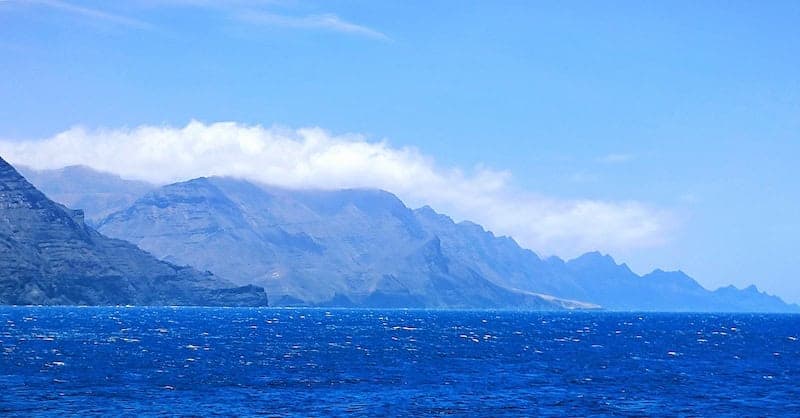
Related tours
Village of Agaete
Agaete is the most beautiful fishing village in northern Gran Canaria. It stands out thanks to its peaceful streets, maritime path, beach and wall. If you do an excursion on the island, this is a good place to eat and to sample Canarian cuisine.
Another good reason to visit Agaete is to see its spectacular scenery, in which the cliffs along the coast contrast with the greenery of the valleys in the island’s interior.
 Related tours
Related tours
Valle de Agaete (Agaete Valley)
Agaete Valley is one of the largest, deepest, and most stunning valleys in northern Gran Canaria. This picturesque valley is home to numerous farms that cultivate tropical fruits, oranges, and coffee, creating a lush, fertile landscape celebrated for its beauty and productivity.
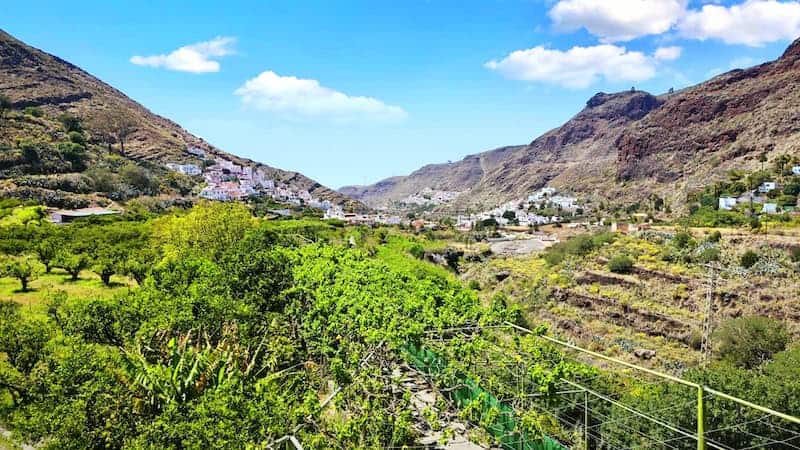
Related tours
Coffee Plantation of Agaete
Located in the Agaete Valley, Finca de los Berrazales houses the only coffee plantation in Europe with a designation of origin. During a visit to this estate, you can savor its exquisite coffee and learn about the entire cultivation and production process, from plant to cup.
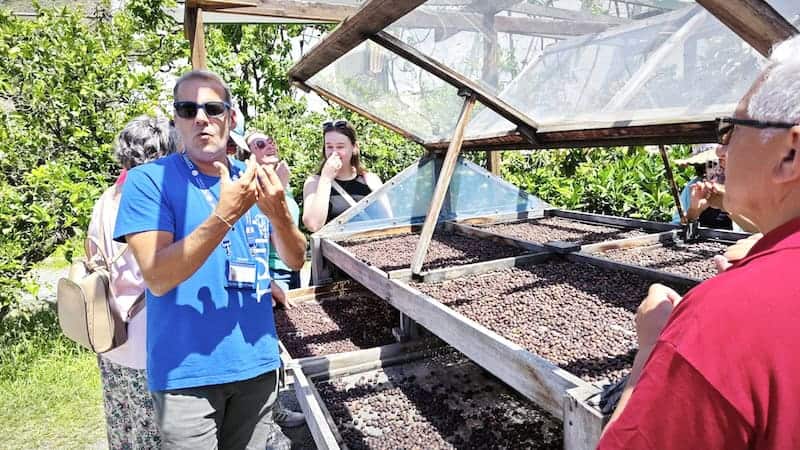
Related tours
Los Tilos de Moya
The area known as Los Tilos de Moya is a leafy forest, mainly of laurisilva and lindens, located near the village of Moya.
The scenery in this thick forest contrasts with the landscapes of the grand ravines and arid lands found in the island’s southern region.![[cml_media_alt id='12605']Paisaje de Los Tilos de Moya[/cml_media_alt]](https://www.okgrancanaria.com/wp-content/uploads/2018/09/IMG_7558.jpg)
Related tours
Northern Natural Pools
The northern coast of Gran Canaria boasts numerous natural pools along its shores. Enjoy refreshing swims in the sea within wave-protected natural pools such as El Agujero in Galdar, Charco de San Lorenzo in Moya, Los Charcones in El Puertillo in Arucas, or Las Salinas de Agaete in Puerto de las Nieves.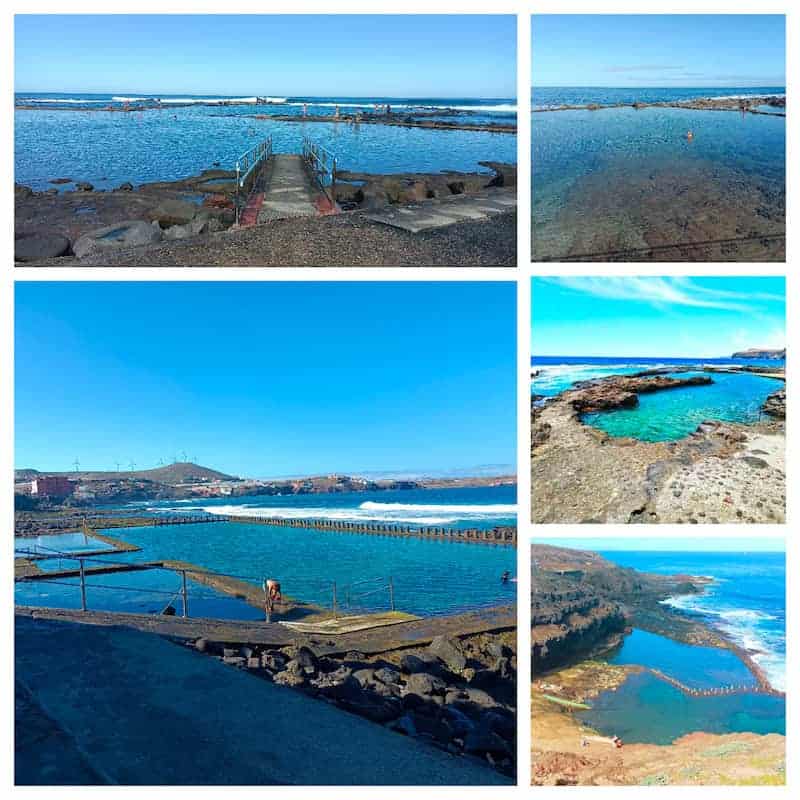
Related tours
Banana Plantations
There are numerous banana plantations in the northern region of Gran Canaria, home to the Canary Islands’ most popular fruit. During some of our excursions, we will show you the unique method of banana cultivation.
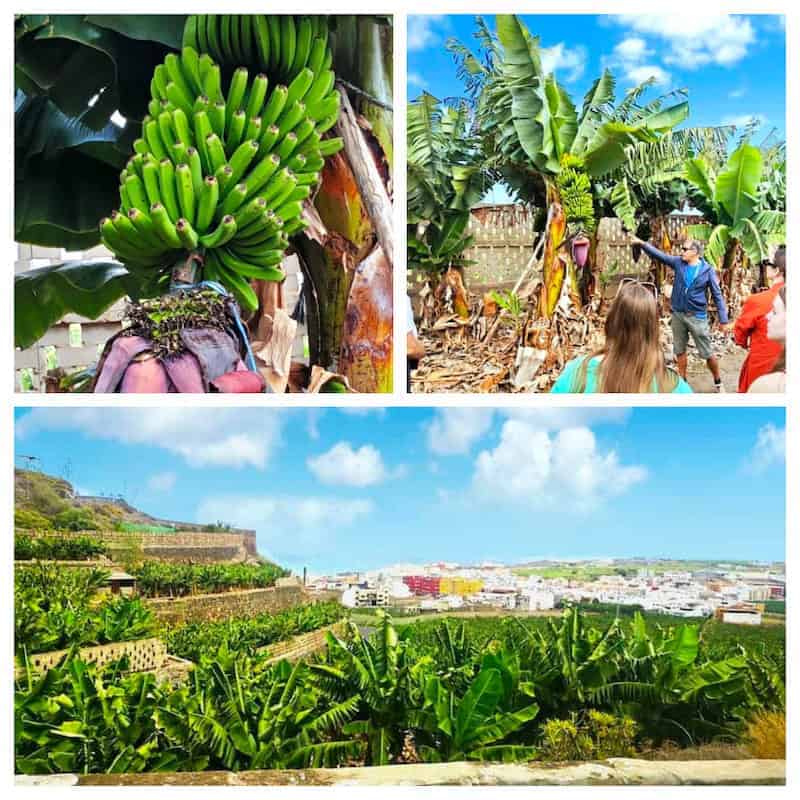
LAS PALMAS DE GRAN CANARIA
The city of Las Palmas de Gran Canaria is the capital of the island and the “Las Palmas” province. It is also the most populous city in the Canary Islands. It is worth exploring: During some of our excursions, we’ll show you the unique method of banana cultivation.
Vegueta Neighborhood
The Vegueta Neighborhood is the city’s historic centre, the seed from which Las Palmas de Gran Canaria flourished. Its origins date back to when the Crown of Castille conquered the island toward the end of the 15th century.
It’s worth walking along its streets and getting to know the Plaza de Santa Ana with the Cathedral,Town Houses, Canary Museum and the Columbus Museum.![[cml_media_alt id='12599']Monumentos destacados del barrio de Vegueta[/cml_media_alt]](https://www.okgrancanaria.com/wp-content/uploads/2018/09/BeFunky-collage.jpg)
Related tours
- Excursion to Las Palmas de Gran Canaria, Bandama Volcano and the Botanical Garden
- Hop-On Hop-Off Las Palmas de Gran Canaria Bus
Santa Ana Cathedral
Declared a National Historic-Artistic Monument, the cathedral is the island’s most important church and various styles are mixed in its architecture, especially neoclassic and gothic. 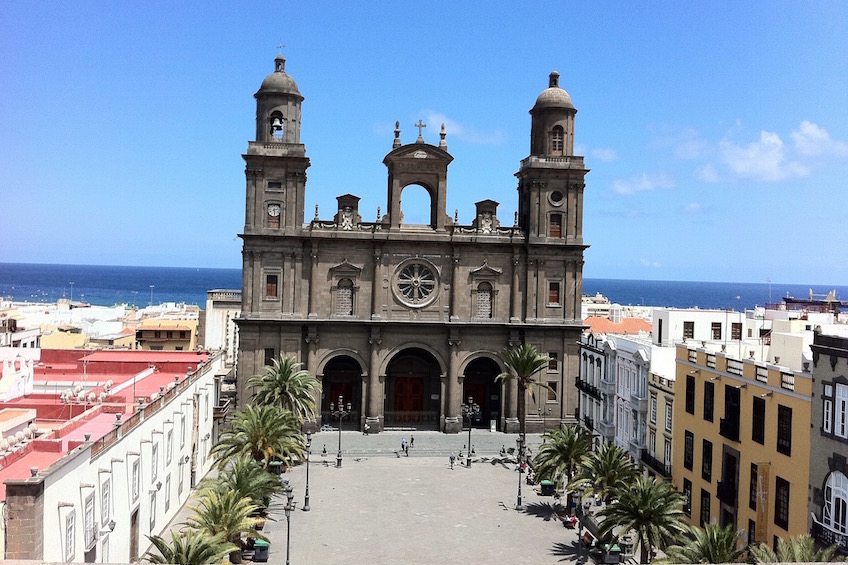 If you decide to go up the bell tower, you will be able to see magnificent views of the Plaza de Santa Ana and the city.
If you decide to go up the bell tower, you will be able to see magnificent views of the Plaza de Santa Ana and the city. ![[cml_media_alt id='11411']visitar Las Palmas de Gran Canaria desde Puerto Rico[/cml_media_alt]](https://www.okgrancanaria.com/wp-content/uploads/2018/04/plaza-de-santa-ana-en-gran-canaria.jpg)
Shopping Districts: Triana, Mesa and López
Triana Street, José Mesa Avenue and López Street are the capital’s most important shopping districts. On these streets and their side streets, the biggest clothing, shoe, perfume and jewelry brands can be found, to name a few, in addition to cafes and restaurants where you can eat and drink.
![[cml_media_alt id='15647']Las Palmas - zona comercial[/cml_media_alt]](https://www.okgrancanaria.com/wp-content/uploads/2017/02/Las-Palma-Mesa-y-Lopez.jpg)
High City Lookout
Nestled in an area not often frequented by tourist is a lookout that offers spectacular views of the city of Las Palmas de Gran Canaria.
From here, you can appreciate the entire city and its most iconic places: Puerto de la Luz, Ciudad Jardín, Maritime Avenue, Alcaravaneras Beach, etc.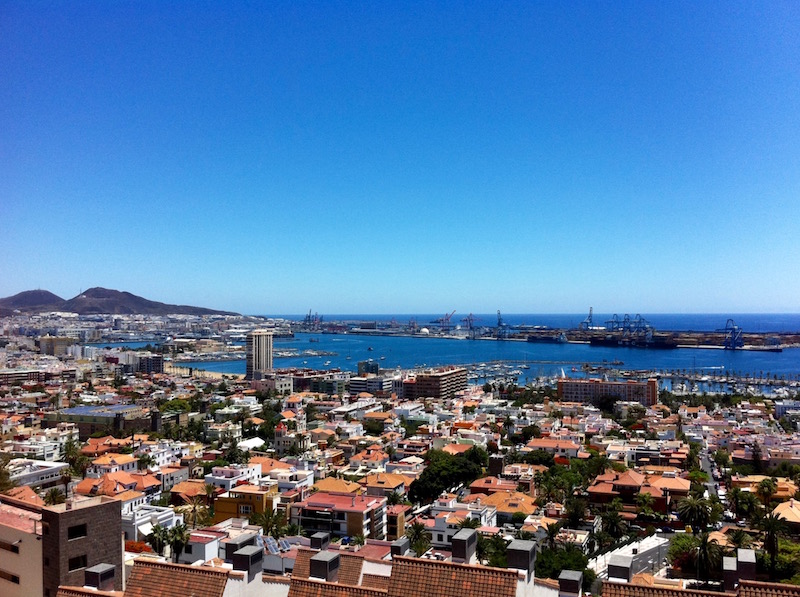
Related tours
- Excursion to Las Palmas de Gran Canaria, Bandama Volcano and the Botanical Garden
- Hop-On Hop-Off Las Palmas de Gran Canaria Bus
Las Canteras Beach
Considered one of the most beautiful urban beaches in the world, Las Canteras Beach is where the city’s residents prefer to enjoy their free time, since they can sunbathe, swim in the sea, walk along the avenue or drink something in the numerous restaurants and terraces.
![[cml_media_alt id='9238']Playa de Las Canteras[/cml_media_alt]](https://www.okgrancanaria.com/wp-content/uploads/2016/08/IMG_1040-1.jpg)
Related tours
- Excursion to Las Palmas de Gran Canaria, Bandama Volcano and the Botanical Garden
- Hop-On Hop-Off Las Palmas de Gran Canaria Bus
- Around the Island tour
- Gran Canaria Highlights – Arucas, Teror, Roque Nublo, Valley of the thousand palms, viewpoint of “Degollada de la Yegua, …

